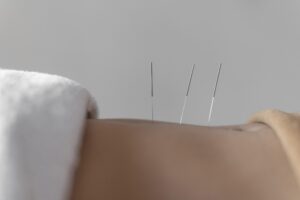In-vitro fertilization (IVF) is a widely used and effective fertility treatment for couples struggling with infertility. However, the IVF process can be physically, emotionally, and mentally demanding. IVF patients explore alternative therapies to boost success, improve well-being, and reduce stress during treatment. Among these therapies, acupuncture, yoga, and dietary supplements have gained attention for their potential benefits. Let’s explore how these therapies may support IVF and improve overall fertility.
Acupuncture: A Holistic Approach to IVF
Acupuncture uses thin needles to stimulate energy flow (“Qi”) at specific body points for healing. While it has been used for centuries to treat various health conditions, acupuncture is increasingly being recognized as a complementary therapy for IVF treatment.

Acupuncture may boost blood flow, balance hormones, and reduce stress, enhancing fertility and conception chances. A JAMA study found higher pregnancy rates in IVF patients who received acupuncture compared to those who did not. Acupuncture-induced relaxation may reduce IVF-related stress and anxiety, which can negatively impact fertility.
Acupuncture is commonly administered before and after embryo transfer, as well as throughout the IVF procedure. Many IVF clinics now offer acupuncture services to complement the medical treatment. However, it’s essential to consult with a qualified acupuncturist who specializes in fertility to ensure that the therapy is safe and effective for your specific situation.
Yoga: Mind-Body Connection and Fertility
Yoga has long been celebrated for its benefits to both physical and mental health. When it comes to fertility, yoga can play a crucial role in supporting the IVF journey by promoting relaxation, reducing stress, and enhancing overall well-being.
Yoga postures (asanas) help improve blood circulation, especially to the pelvic region, which may improve reproductive health. Certain poses, such as the “bridge” or “leg-up-the-wall,” are believed to improve blood flow to the ovaries and uterus, creating a more favorable environment for implantation. Furthermore, yoga helps maintain a healthy body weight and balance hormone levels, both of which are important for infertility treatment.
In addition to the physical benefits, yoga emphasizes mindfulness and relaxation. Deep breathing techniques, such as pranayama, are used to calm the mind and reduce anxiety. Since stress can negatively affect fertility by interfering with hormone levels, incorporating yoga into your routine can provide a sense of peace and emotional stability during the IVF process.

For optimal results, it is recommended to practice yoga regularly, with a focus on gentle, restorative poses that ease tension without putting excessive strain on the body. Many fertility clinics and wellness centers offer yoga classes specifically tailored for women undergoing IVF.
Supplements: Nutritional Support for IVF Success
While lifestyle changes and medical treatments are essential for IVF success, nutritional support through supplements can also play a significant role in optimizing fertility. Several vitamins and minerals are believed to support reproductive health and improve IVF outcomes. However, it’s crucial to consult with a healthcare provider before incorporating supplements into your routine.
- Folic Acid: Folic acid is a well-known supplement that helps prevent neural tube defects in the baby. It is also essential for cell division, making it important for both male and female fertility. Most IVF clinics recommend that women take 400-800 mcg of folic acid daily before and during pregnancy.
- Coenzyme Q10 (CoQ10): CoQ10 is an antioxidant that plays a role in energy production within cells. Some studies suggest that CoQ10 supplementation may improve egg quality in women undergoing IVF, particularly those over the age of 35, by increasing mitochondrial function.
- Vitamin D: Vitamin D is crucial for overall health and has been linked to reproductive health. Research shows that vitamin D deficiency may reduce IVF success rates, so it’s important to maintain adequate levels through supplements or exposure to sunlight.
- Omega-3 Fatty Acids: Omega-3 fatty acids, found in fish oil, are known to support overall health and reduce inflammation in the body. Some research suggests that omega-3s may improve egg quality and increase blood flow to the reproductive organs.
- Vitamin E and Zinc: These antioxidants are important for reproductive health. Vitamin E helps protect eggs from oxidative stress, while zinc plays a role in hormone regulation and egg production.

Consult your doctor to ensure proper dosage and avoid interactions before taking these supplements.
Conclusion
Acupuncture, yoga, and supplements can be valuable additions to the IVF journey. These therapies may help improve reproductive health, reduce stress, and increase the chances of a successful pregnancy. However, it is essential to remember that these complementary therapies should not replace medical treatment but rather be used in conjunction with conventional IVF procedures. Always consult with a healthcare provider before starting any new therapies to ensure they are safe and appropriate for your specific needs. By combining the expertise of modern medicine with holistic approaches, you can create a more balanced and supportive IVF experience.